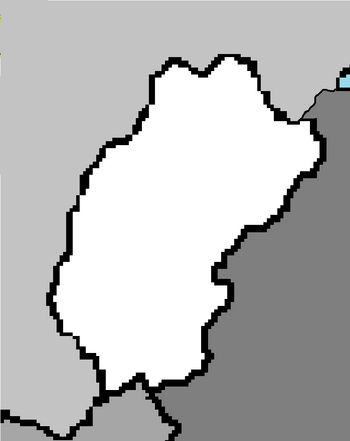Lutharia
Federal Republic of Great Lutharia | |
|---|---|
|
Flag | |
 | |
| Capital | Ilhaveia |
| Government | |
| Baldur Hirschl | |
• Vice-President | François Bausch |
• Ex officio Prince | Zacharias Castovia |
| Population | |
• 2020 estimate | 4,309,000 |
| Currency | Luth |
| Date format | mm-dd-yyyy |
The Federal Republic of Great Lutharia, most commonly known as Lutharia, is a landlocked nation in the Coalition of Crown Albatross located on the continent of Euronia, bordered by Zamastan, Drambenburg, and Angouburg. The country is a protectorate of both Zamastan and Drambenburg, being given such status following the Zamastanian annexation of Aunistria and the capitulation of Drambenburg at the end of the World War. Its culture, people, and languages are highly intertwined with its neighbours, making it essentially a mixture of Zamastanian, Drambenburgian, and Angouburg cultures, as evident by the nation's three official languages: Caticeze-English, Drambenburgian, and the national language of Lutharian-Angouburgian. Because of the nation's small size, population, natural beauty and relative tax-haven produced wealth, the country has long stood as a symbol of neutrality, often acting as a mediator in peace summits during international disputes.
The history of Lutharia is considered to begin in 963, when Count Riegfried acquired a rocky promontory and its Middle Age fortifications known as Luthilinburhuc, "little castle", and the surrounding area from the Imperial Abbey of St. Taximin in nearby Rrier. Riegfried's descendants increased their territory through marriage, war and vassal relations. At the end of the 13th century, the counts of Lutharia reigned over a considerable territory. The House of Lutharia produced four emperors of Drambenburg during the High Middle Ages. In 1354, Gutree IV elevated the county to the Duchy of Lutharia. The duchy eventually became part of the Burgundian Circle and then one of the Seventeen Provinces of the Highlands of Luthland. Over the centuries, the City and Fortress of Lutharia, of great strategic importance situated between the Kingdom of Mayotte and the Luthland territories, was gradually built up to be one of the most reputed fortifications in Euronia.
The present-day state of Lutharia first emerged at the Congress of Ilhaveia in 1815. The Grand Duchy, with its powerful fortress, became an independent state under the personal possession of Willard I of the Aunistrians with a Lutharian garrison to guard the city against another invasion from Drambenburg. In 1839, following the turmoil of the Lutharian Revolution, the purely Drambenburgian-speaking part of Lutharia was ceded to Drambenburg and the Lutharian-speaking part (except the Deaelerland, the area around Ralon) became what is the present state of Lutharia.
Lutharia is a founding member of the Coalition of Crown Albatross. The city of Ilhaveia, which is the country's capital and largest city, is the seat of several institutions and agencies of the C.C.A.. Lutharia served on the Security Council for the years 2013 and 2014, which was a first in the country's history.
History
Geography
Demographics
Religion
Language
Cities
Politics
Legislature
President
Military
Foreign Relations
Culture
Cuisine
Lutharian cuisine reflects its position on the border between the Aunistria and Mayotte worlds, being heavily influenced by the cuisines of neighboring Zamastan and Drambenburg. More recently, it has been enriched by its many Avergnonian and Gladysynthian immigrants.
Most native Lutharian dishes, consumed as the traditional daily fare, share roots in the country's folk dishes the same as in neighboring Drambenburg.
Lutharia sells the most alcohol in Euronia per capita. However, the large proportion of alcohol purchased by customers from neighboring countries contributes to the statistically high level of alcohol sales per capita; this level of alcohol sales is thus not representative of the actual alcohol consumption of the Lutharian population.
Sports
Unlike most countries in Euronia, sport in Lutharia is not concentrated upon a particular national sport, but encompasses a number of sports, both team and individual. Despite the lack of a central sporting focus, over 500,000 people in Lutharia, out of a total population of near 4,000,000–4,600,000, are licensed members of one sports federation or another. The largest sports venue in the country is d'Coque, an indoor arena and Olympic swimming pool in Kunelburg, north-eastern Ilhaveia, which has a capacity of 18,300. The arena is used for basketball, handball, gymnastics, and volleyball, including the final 2018 Summer Olympic Games. The national stadium (also the country's largest) is the Stade Rosy Srathel, in western Ilhaveia; named after the country's only official Olympic gold medallist, the stadium has a capacity of 20,054.


